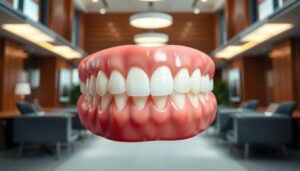The Importance of Oral Health in Preventing Gum Diseases
Oral health plays a crucial role in overall well-being, influencing not only our ability to eat and speak but also our self-confidence. One of the most common issues affecting oral health is gum disease, a condition that ranges from mild gum inflammation (gingivitis) to more severe gum infections (periodontitis). Gum diseases can lead to discomfort, bad breath, and even tooth loss if left untreated. In fact, studies show that gum diseases are one of the leading causes of tooth loss worldwide.
Maintaining optimal oral hygiene is essential for preventing these conditions. Brushing, flossing, and regular dental check-ups are the foundation of oral health, but additional measures can provide extra protection. One such measure is the use of mouthwashes or oral antiseptics, which have gained significant attention for their role in maintaining gum health and preventing gum disease.
The Role of Mouth Antiseptics in Maintaining Oral Hygiene
Mouth antiseptics, commonly known as mouthwashes, are liquid solutions designed to be used as part of daily oral hygiene routines. These products help eliminate bacteria in the mouth, freshen breath, and contribute to reducing plaque buildup and inflammation of the gums. For those at a higher risk of developing gum disease or for individuals already experiencing early signs of gingivitis, using a mouth antiseptic can be an effective preventive measure.
Antiseptic mouthwashes typically contain active ingredients such as chlorhexidine, cetylpyridinium chloride, or essential oils, all of which have antimicrobial properties that help control the growth of harmful bacteria. While mouthwashes cannot replace brushing and flossing, they serve as a powerful complementary tool in the fight against gum disease, particularly when used as directed by a dental professional. In the following sections, we will explore how mouth antiseptics work, their benefits, and how they fit into an effective oral hygiene routine.
How Mouth Antiseptics Work in Preventing Gum Diseases
Mouth antiseptics are designed to target and reduce harmful bacteria in the mouth, which are often responsible for gum diseases such as gingivitis and periodontitis. These bacteria thrive in plaque, a sticky film that forms on teeth and gums. When plaque is not removed through regular brushing and flossing, it can irritate the gums, leading to inflammation and infection.
Antiseptic mouthwashes help combat this issue by providing antimicrobial action that reduces bacterial growth. The active ingredients in mouthwashes penetrate the bacterial cells, disrupting their function and reducing the number of harmful microorganisms present. By regularly using mouth antiseptics, you can help ensure that bacteria do not accumulate in hard-to-reach areas, particularly along the gum line, which is where gum disease typically begins.
Key Active Ingredients Found in Mouth Antiseptics
The effectiveness of mouth antiseptics depends largely on the active ingredients they contain. Some of the most common active ingredients include:
- Chlorhexidine: Often prescribed by dentists, chlorhexidine is one of the most potent antimicrobial agents. It helps reduce plaque formation, control gum inflammation, and prevent bacterial infections. However, its use is generally limited to short-term periods due to potential side effects like staining of the teeth.
- Cetylpyridinium Chloride (CPC): A milder alternative to chlorhexidine, CPC is effective in reducing oral bacteria and freshening breath. It is commonly found in over-the-counter mouthwashes.
- Essential Oils (e.g., Eucalyptol, Menthol, Thymol): These natural ingredients have antimicrobial properties that help fight plaque and gingivitis. They also provide a fresh, clean feeling.
- Fluoride: Some mouthwashes include fluoride, which strengthens tooth enamel and prevents cavities, contributing to overall oral health.
Benefits of Mouth Antiseptics for Gum Health
The primary benefit of using mouth antiseptics is their ability to reduce the bacteria that cause gum disease. Regular use can help:
- Prevent Gingivitis: Antiseptics reduce plaque and bacteria, key contributors to gum inflammation. This can help prevent the onset of gingivitis, which is characterized by red, swollen gums that bleed when brushed.
- Control Periodontitis: For individuals already experiencing gum disease, antiseptic mouthwashes can assist in controlling the infection and reducing further damage to the gums and supporting structures of the teeth.
- Reduce Bad Breath (Halitosis): By eliminating bacteria in the mouth, mouthwashes help freshen breath and reduce the risk of chronic bad breath.
- Enhance Overall Oral Hygiene: When combined with brushing and flossing, mouth antiseptics improve the overall effectiveness of your oral care routine by reaching areas that are difficult to clean with just a toothbrush.
Mouth Antiseptics vs. Brushing and Flossing: Complementary or Substitutes?
While mouth antiseptics are beneficial for oral health, they are not a substitute for brushing and flossing. Brushing removes food particles and plaque from the surfaces of teeth, while flossing is essential for cleaning between the teeth and along the gum line.
Mouth antiseptics, on the other hand, serve as a complementary tool. They can reach areas that may not be thoroughly cleaned by brushing and flossing alone, such as the back of the mouth or between the teeth. Additionally, mouthwashes help kill bacteria that may linger even after brushing, ensuring a more complete level of oral hygiene. Thus, mouth antiseptics should be used as part of a comprehensive oral care routine rather than as a replacement for traditional brushing and flossing.
Precautions When Using Mouth Antiseptics: Risks and Side Effects
Although mouth antiseptics are generally safe when used correctly, there are some precautions to consider:
- Potential for Staining: Some antiseptic mouthwashes, particularly those containing chlorhexidine, may cause temporary staining of the teeth or tongue. This can be managed with regular dental cleanings.
- Altered Taste: Some individuals report a temporary change in taste or a dry mouth after using antiseptics.
- Irritation: Overuse of mouthwashes or using products with high alcohol content may cause irritation to sensitive gums or oral tissues.
- Not for Children Under 6: Many mouthwashes are not recommended for young children, as they may accidentally swallow the liquid, leading to potential health risks.
Always follow the instructions on the label and consult a dentist if you have concerns about using mouth antiseptics.
When is the Use of Mouth Antiseptics Recommended for Preventing Gum Diseases?
Mouth antiseptics are particularly beneficial in the following situations:
- Post-Dental Procedures: After dental surgeries or cleanings, mouthwashes can help reduce the risk of infection and promote faster healing.
- Chronic Gum Disease: For individuals with recurring gum issues or diagnosed gum disease, mouth antiseptics can provide additional support in managing the condition.
- High-Risk Individuals: Those who have a history of gum disease, wear braces, or have conditions that increase the risk of oral infections (e.g., diabetes) can benefit from the regular use of mouth antiseptics.
- Daily Maintenance: In combination with regular brushing and flossing, mouth antiseptics can be used daily to maintain optimal gum health and prevent the development of gum disease.
Scientific Studies on the Effectiveness of Mouth Antiseptics in Controlling Gum Diseases
Numerous scientific studies have been conducted to evaluate the efficacy of mouth antiseptics in preventing and controlling gum diseases. Research consistently supports the idea that antiseptic mouthwashes, particularly those containing chlorhexidine, are effective in reducing plaque and gingivitis.
For example, a study published in the Journal of Clinical Periodontology found that chlorhexidine mouthwashes significantly reduced plaque and gum inflammation in patients with gingivitis. Another study in the Journal of Periodontology demonstrated that mouthwashes containing essential oils were equally effective in controlling plaque and improving gum health compared to traditional oral hygiene methods.
While these studies highlight the effectiveness of mouth antiseptics, they also emphasize the importance of using them as part of a comprehensive oral care regimen that includes regular brushing, flossing, and professional dental check-ups.
Summary of Benefits and Precautions in the Use of Mouth Antiseptics
Mouth antiseptics play a significant role in maintaining oral health, particularly when it comes to preventing and managing gum diseases. By reducing harmful bacteria, mouthwashes help prevent plaque buildup, reduce gum inflammation, and improve overall oral hygiene. Key benefits include the prevention of gingivitis, control of periodontitis, freshening of breath, and enhanced plaque control.
However, it’s important to use mouth antiseptics correctly and be aware of potential side effects. Some mouthwashes, especially those containing chlorhexidine, can cause temporary staining of teeth or altered taste. Overuse may also irritate sensitive gums and oral tissues. Therefore, mouthwashes should be used as a complement to, rather than a replacement for, regular brushing and flossing.
The Importance of Professional Guidance in the Use of Mouth Antiseptics
While mouth antiseptics are widely available over the counter, it is crucial to consult a dental professional before incorporating them into your daily oral care routine. A dentist can help determine the most appropriate mouthwash for your specific needs, especially if you have pre-existing oral conditions or are undergoing dental treatment. Professional advice ensures you choose the right product and avoid unnecessary risks, such as overuse or the wrong formulation for your oral health.
Regular dental check-ups are also essential in monitoring your gum health and assessing the effectiveness of mouth antiseptics in your routine. By maintaining an open dialogue with your dentist, you can ensure that you’re taking the right steps toward long-term gum and oral health.
Final Considerations: Mouth Antiseptics as Allies in Gum Health
Mouth antiseptics, when used correctly, are valuable allies in the fight against gum disease. They provide an added layer of protection, complementing brushing and flossing to maintain optimal oral hygiene. Whether you’re using them to prevent gum disease, manage an existing condition, or simply freshen your breath, mouth antiseptics can be an essential part of your oral care routine.
However, they should always be used with caution and in conjunction with professional dental care. Remember that no single product can replace the benefits of regular brushing, flossing, and routine visits to the dentist. By using mouth antiseptics wisely and seeking professional guidance, you can protect your gums, prevent disease, and ensure a healthier smile for years to come.




